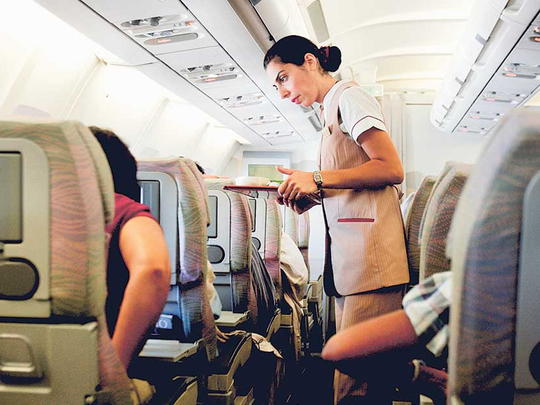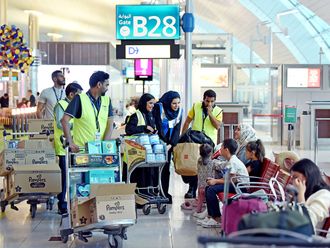
Dubai: Over the past 30 years, Emirates airline has established itself as the regions biggest and most well known carrier. It’s network of 146 destinations worldwide and a fleet of 234 modern wide-body aircraft — including freighters — has also made it one of the most popular airlines to work for.
The airline currently employs 20,000 flight attendants, which is more than 20 per cent of the 84,000 staff parent company Emirates Group employs. In 2014, Emirates hired 5,500 new flight attendants — which came from more than 200,000 applications — to meet demand spurred by growth and attrition. This year the airline plans to hire a similar amount, having already hired over 3,000 as of July, Alison Ward, Vice President — Human Resources, told Gulf News.
And the airline continues to maintain its appeal among the masses. It receives about 500 applicants every day for flight attendant positions and expects to hire between 5,000 and 6,000 each year until at least 2020, Ward said.
By 2020, the airline is forecasting it will employ 29,550 flight attendants, an airline spokesperson told Gulf News by email. That year it expects to fly 70 million passengers compared to the 44.5 million it flew in its last financial year.
Flight attendants at Emirates — and other Gulf carriers — enjoy perks that many other carriers do not offer, including free accommodation, utilities, dry cleaning and transportation to and from work. Its flight attendants also have to adhere to a strict etiquette and grooming policy and are not allowed to bring non-Emirates employees into staff accommodation overnight.
The airline has shown its appreciation over the years having handed out almost $1 billion in bonuses to staff — including to flight attendants — over the last three decades, according to a recent airline statement. Earlier this year, Emirates gave its employees the second highest bonus amount ever — nine weeks salary — after the airline recorded its second most profitable year ever, making Dh5.5 billion for the year ending March 31, 2015.
The airline’s single-largest nationality among flight attendants are British. Not surprising when the airline has set up a human resource office in the United Kingdom plus the airlines services to London Heathrow, London Gatwick, Manchester, Birmingham, Newcastle and Glasgow and sponsorship of English Premier League club Arsenal, one of the world’s most well-known football teams.
Egyptians, Indians, Australians, Lebanese, Filipino, Polish, Brazilian, French and South Korean make up the rest of the top ten.
Sophie Burgess, an Australian who left a job as a performer at Disneyland Tokyo to join the airline 18 months ago, said it was the desire to travel that made her apply to work at Emirates. “I had the travel bug badly and wanted to be paid to travel,” she told Gulf News.
Burgess’ first day of training alongside a hundred other new flight attendants she had met just the day before was “pretty intimidating,” she said.
Training is not simply learning personal presentation and how to serve customers. Flight attendants are put through rigorous training that includes exams and practice for real life emergencies. “You may have to deliver a baby on board or you may have to use a defibrillator to save someone’s life,” Ward said.
The airline also has minimum recruitment age of 21 for flight attendants, which is because the legal age to consume and serve alcohol in the United Arab Emirates, Ward said.
Burgess, who has a Bachelor of Arts degree majoring in Dance, said she believes joining Emirates will prepare her for the next step in her career. “I just wanted to travel, but ... [the company] grows so fast, it opens up so many doors for other opportunities ... I think that whatever I decide to do in the future [this job] will lead me to that,” Burgess said.
As a Middle East airline, Emirates has a policy of having at least one Arabic speaker on-board each flight, Ward said.
Mohammad Kamalou, an Egyptian who works in the business cabin, joined the airline three years ago after working a desk job at a bank in Egypt. “I didn’t like routine ... I didn’t like to sit at the computer,” Kamalou, who has a degree in Business Administration, told Gulf News. “I just wanted to travel,” he said while also admitting he thought he would not stay beyond the initial three years and that “everything was going to be real easy”.
Kamalou soon found out that there are “good career prospects” at Emirates after being promoted from working in economy class to business class. He said he now wants to become a senior flight attendant and a trainer at the airlines training college.
Beverly Tapia, a Filipino who joined the airline nine years ago after also working in a bank, this time in Singapore, is one example of carving out a career at the airline. In fact, there are 1766 flight attendants who have been working for the airline for more than a decade.
Just like her colleagues, Tapia too admits she was initially attracted to the travel perks of the job. Today, she is a senior flight attendant and also a part time trainer at the training college that also trains dnata, Emirates Group’s ground handling, airport services and travel subsidiary, and Marhaba staff.
“It’s just very exciting,” Tapia, who has a Degree in Philosophy and Masters in Business Administration, told Gulf News.
But just like many other major employers around the world, the airline has struggled to keep everyone happy. Earlier this year, the Wall Street Journal reported Emirates was dealing with labour disputes that are more commonly associated with its legacy competitors.
Flight attendants complained they were being asked to work more hours, there had been a shortening of layover times between connecting flights and first class flight attendants were having to work in economy class to make up for staff shortage. The airline also reportedly stopped a performance review of each flight attendant after every flight. Gulf News was able to independently verify these claims with Emirates flight attendants.
The airline held meetings with its flight attendants, allowing them to voice their grievances directly with senior management. Emirates had held three sessions as of March 20, according to the Wall Street Journal. Gulf News is aware of at least one more session since then.
Emirates dismissed the report telling the Wall Street Journal it had not shortened layovers and that any changes to staff routines are exceptions that comply with safety rules.
Kamalou volunteered that “Emirates takes care of us,” while Burgess said she was comfortable with how the airline handles grievances. “They’ve dealt with that very well in terms of looking after us like dealing with feedback that we have. they’re always asking us for our opinions. They make changes frequently,” she said.
“[If] people have problems, I feel that we’re able to speak up and give out point of view and it is often heard,” Burgess added.
Both Kamalou and Burgess were chosen by Emirates for this article and a member of the airline’s corporate communications team sat in on the separate interviews.
A flight attendant not authorised to speak to the media told Gulf News the workplace environment has improved since the meetings with senior management and removal of the performance review.
Emirates declined to state its attrition rate for flight attendants, however, it is fairly low compared to other airlines, Ward said, adding that majority of flight attendants complete their initial three year contract.
But Ward admits that despite a diligent screening processes the airline does not “get it right all the time”.
“It’s not the job for everyone. It is hard work,” she said.












